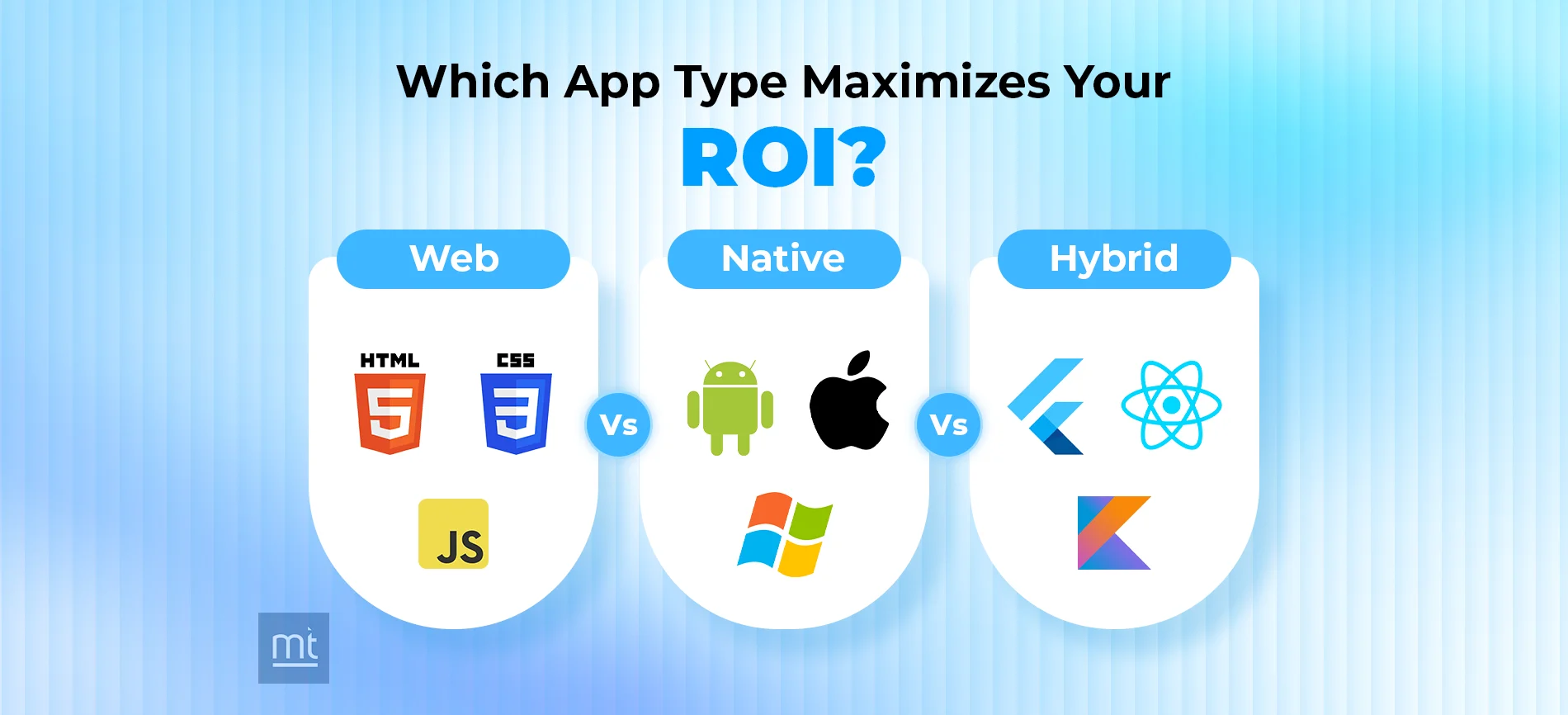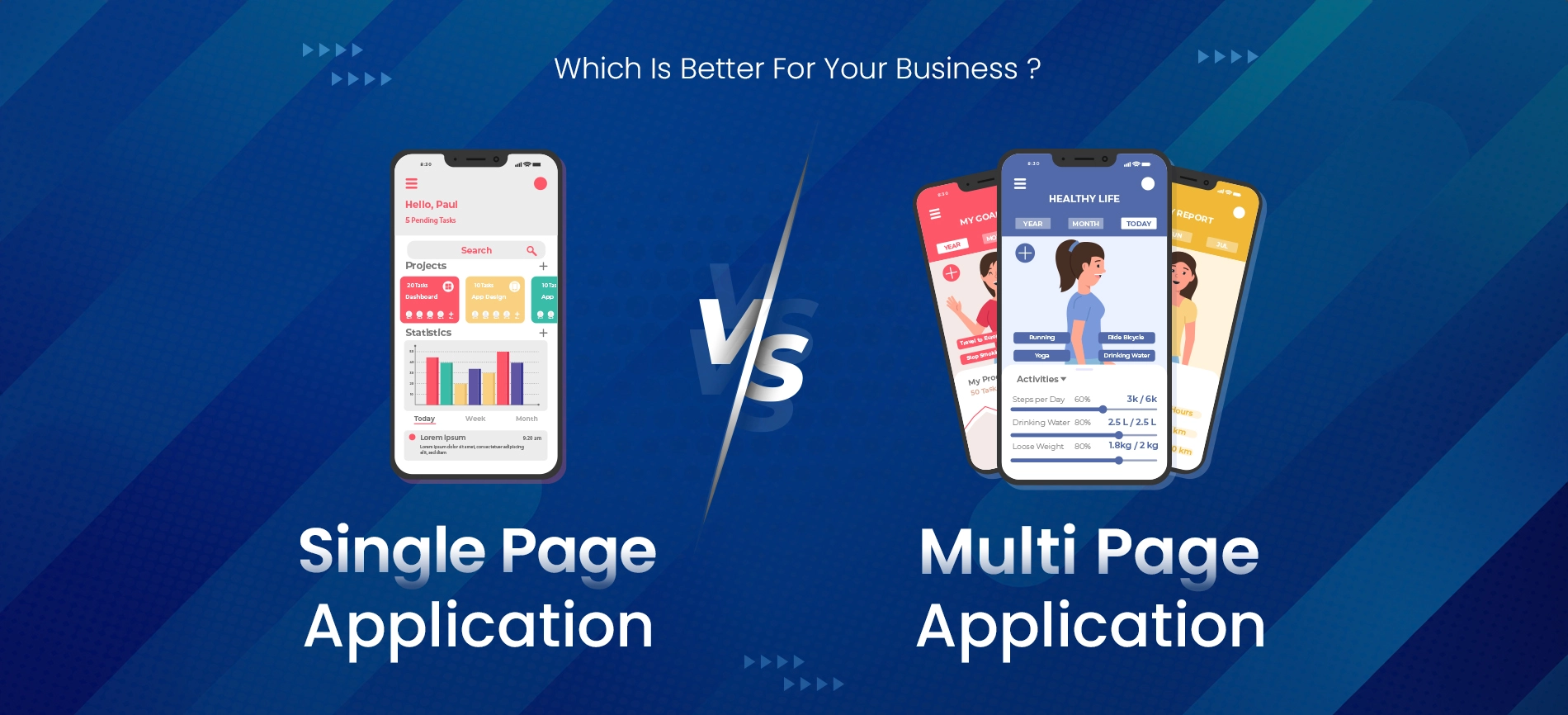Get Free Trial Week Developer Access, Try Before You Hire. Click Here to Claim Now
Introduction:
Mobile apps are a deciding factor in determining whether or not your business is a success. With a strong application, you can ensure great visibility, maximum traction and increased conversions.
As more people are relying on their smartphones for everything, from shopping to interaction, it is a great time to roll out your application. Diving straight into development may not help you accomplish your goals.
You should move from strategy to planning phase before building the application. Choosing the right technology and app development approach are cornerstones of a successful application.
If you fail to choose a suitable approach, you might face issues such as poor app performance and lacklustre user experience. These things come at a great cost as your overheads will automatically increase.
To avoid these costs, you can use this guide to select the approach and dive into development with a strategic plan.
Overview of Hybrid App Development Approach
Hybrid app development allows developers to create applications using web technologies, such as HTML, CSS and JavaScript. They are mobile applications encapsulated within a web application that are accessed via the web browsers.
You can use frameworks, such as React Native or Ionic to build the entire application. By combining the best of web and native app development approaches, you can build cost-efficient and effective solutions that offer exceptional performance and experience.
Key Features of Hybrid
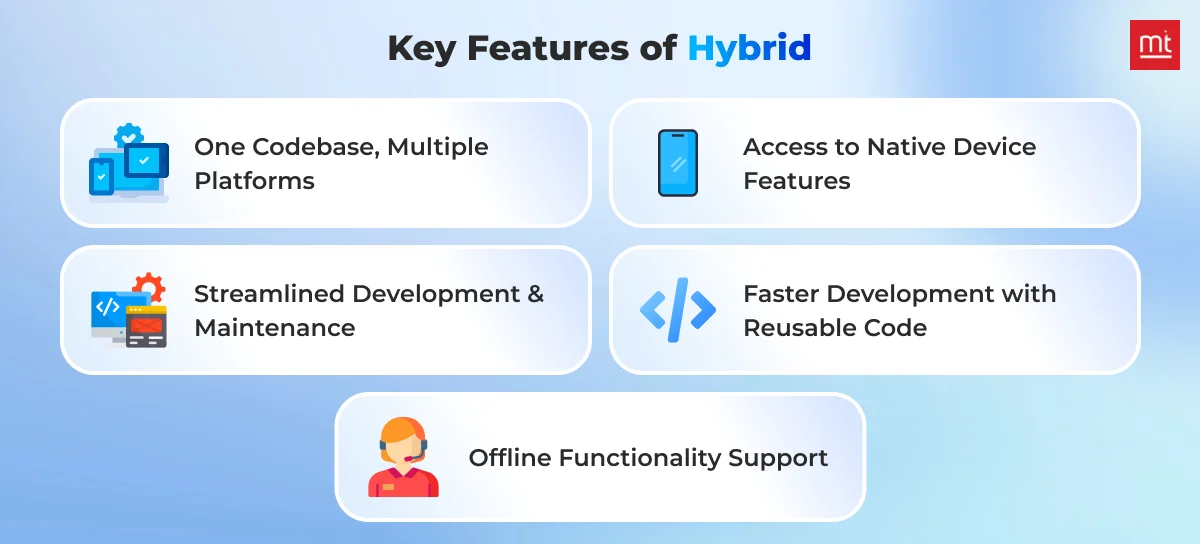
- Hybrid applications can run on diverse browsers and operating systems, such as iOS and Android using a single codebase.
- These apps can easily access the native device features, such as GPS, camera and accelerometer.
- You can create a single codebase and share it across multiple platforms that help streamline development and maintenance processes.
- The hybrid approach allows for faster and easier app development, fostering reusable code
- It promotes offline abilities, which ensures that users can access the application without the internet connection.
Pros of Hybrid
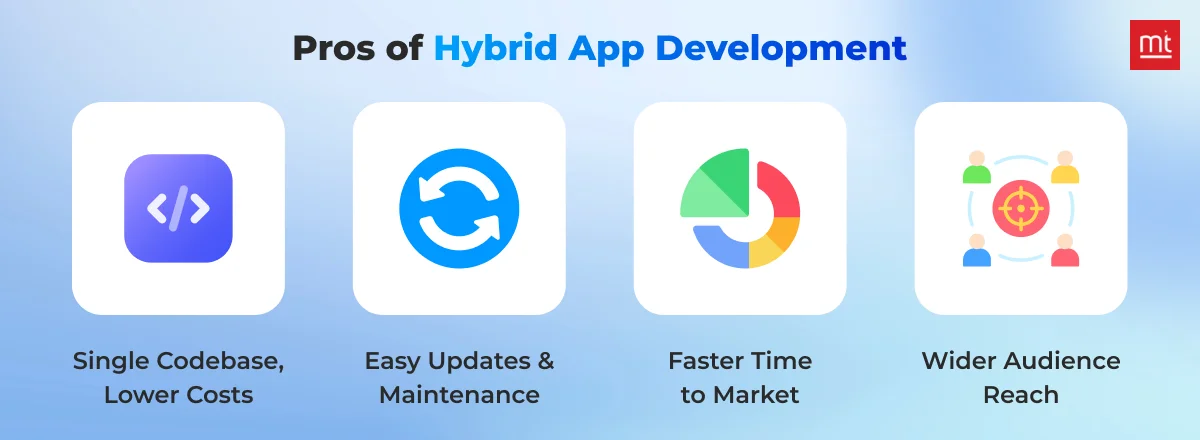
- The single codebase allows you to reuse the code and reduce the mobile app development costs
- Simplify the update and bug fixes across platforms fostering easy maintenance
- Accelerates time to market as you can reach multiple platforms simultaneously
- Increases the reach by allowing you to access a wider audience segment.
Cons of Hybrid
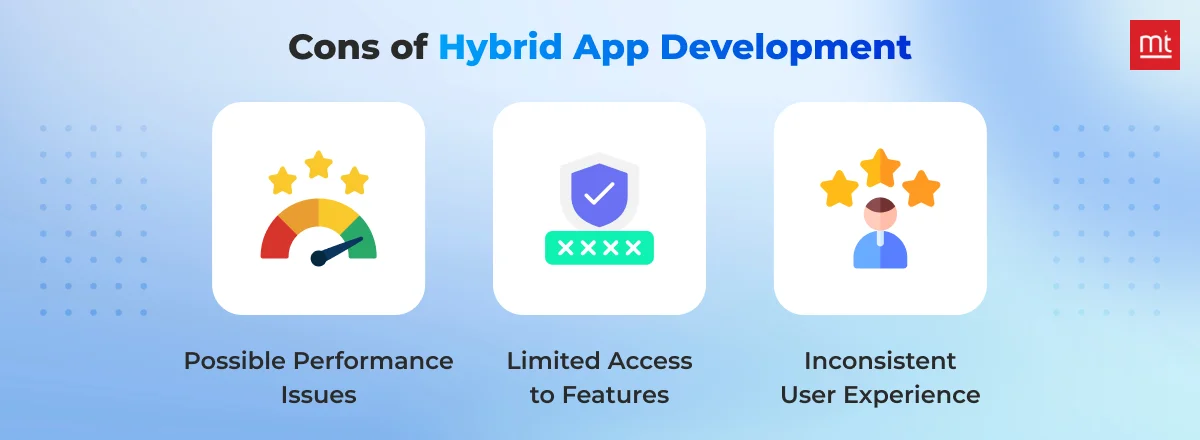
- You may experience performance issues when using the application. It may lower the speed and create a lag in response
- Restricts your access to advanced features and device-specific functionality
- Varying user experience across devices and browsers
Use Cases of Hybrid
- It is ideal for enterprise app development, where accessibility and rapid deployment are crucial
- You can use the approach to build information portals and news blogs, which are content-centric applications
- Hybrid approach is ideal for MVP development for startups, where quick launches are crucial.
Overview of Cross-platform Approach
Cross-platform app development approach involves creating codes that run on multiple operating systems. Your developer will create a single codebase that works on all OS, such as iOS and Android.
Using this method, you can streamline development, increase reach and accelerate time to market. It develops apps that match the user experience unleashed by native applications. This makes it increasingly good for the app developers.
Key Features of Cross-platform
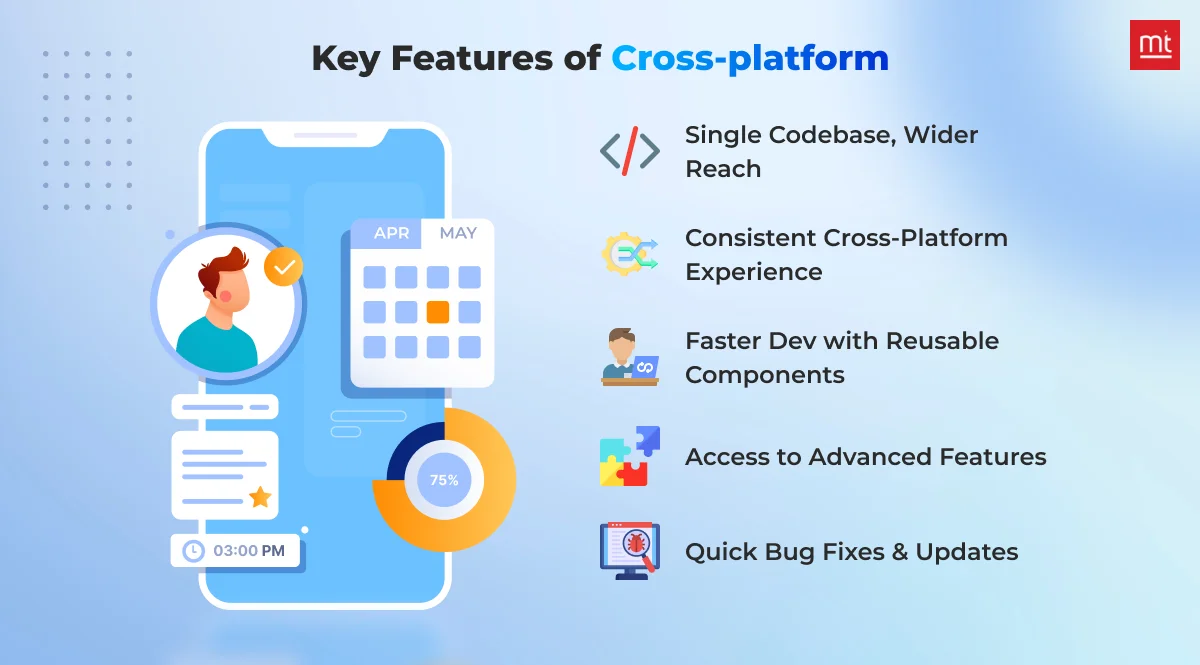
- You can create and use a single codebase that works across operating systems boosting the app’s reach
- It helps offer a consistent user experience that matches the look and feel of the platforms
- You can use the reusable UI components and modules for faster application development
- Using the development frameworks and IDEs, you can access top-notch features and functionality
- This approach helps you fix the bugs faster and update the app across platforms
Pros of Cross-platform
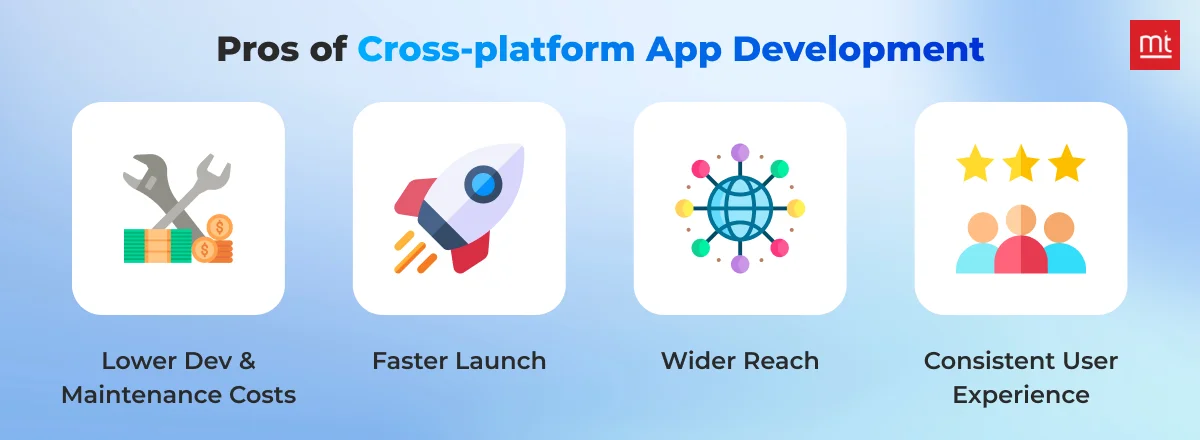
- The approach lowers the development and maintenance costs, owing to the use of single codebase
- You can use this approach to speed up development and deployment across platforms
- It is accessible to a wider audience as users across devices and operating systems can access the application
- It offers a consistent user experience across platforms
Cons of Cross-platform
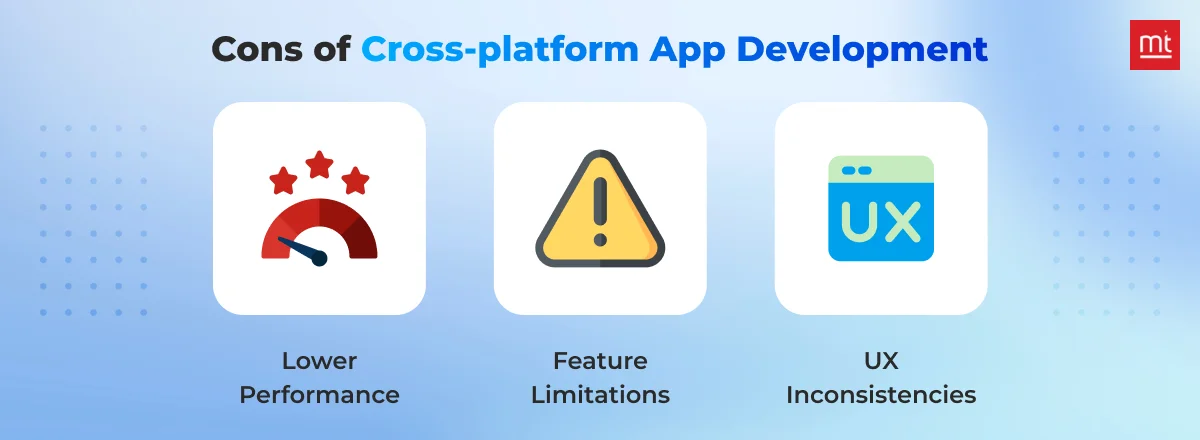
- They may not offer performance such as native applications, especially when handling complex tasks
- Your application may not be able to access certain device-specific features
- There may be inconsistencies with regards to user experience
Use Cases of Cross-platform
- It is best fit for internal tools and applications where you need to deploy apps across several devices
- You can create consumer applications using this approach
- It is also fit for MVP development for startups
Key Factors to Compare Between Hybrid and Cross Platform Approaches
While each approach is unique, they differ in diverse ways. For instance, one may need a particular expertise while the other may require learning another technology from scratch. Let’s compare these two approaches against the most crucial selection factors.
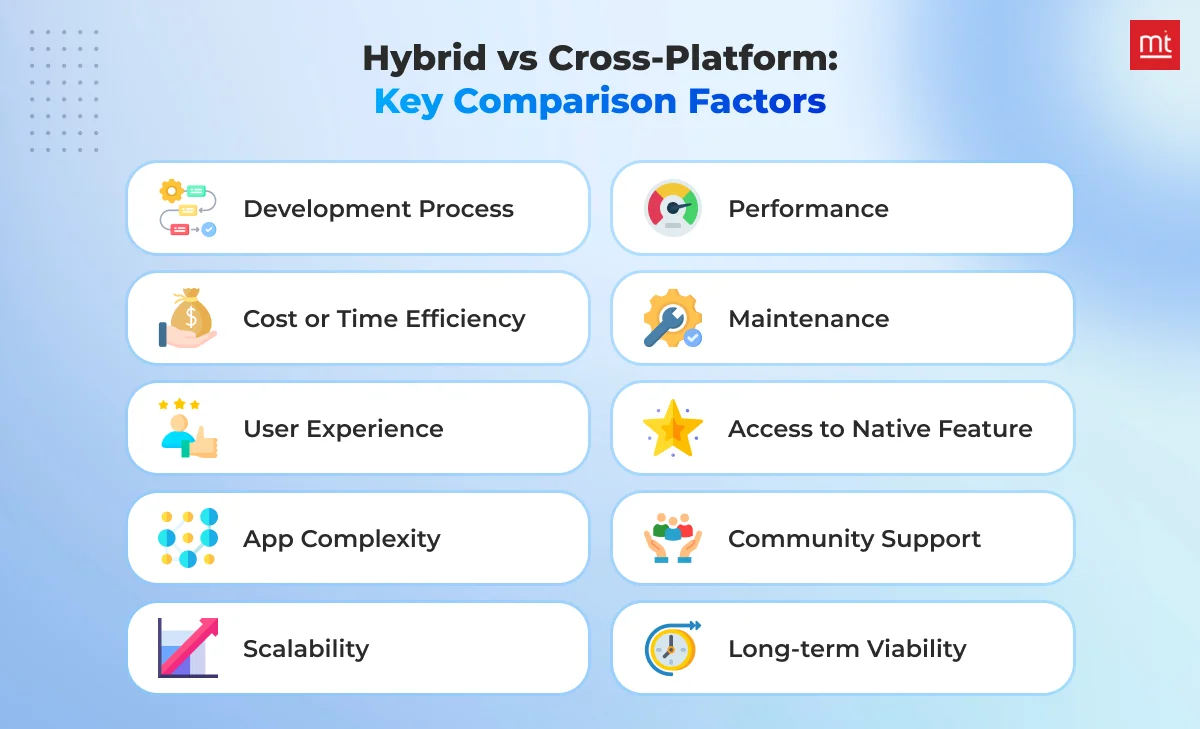
#1. Development Process
Hybrid Development: To use this approach, you must be competent with technologies like HTML and CSS. These technologies are wrapped in a native container to build native-like applications. you must be proficient with frameworks like Ionic and Cordova for the best outcomes.
Cross Platform Development: In this approach, the developer needs to build the codebase once and share it across platforms. They don’t need to reinvent the codebase or make changes to support a particular platform. They can use frameworks like React Native and Flutter to build these applications.
#2. Performance
Hybrid Development: There is an additional layer between the application and the device, which can cause performance issues.
Cross Platform Development: This approach promises a better performance when compared with hybrid apps. In case you use React Native framework, it assures inclusion of native components.
#3. Cost or Time Efficiency
Hybrid Development: They are generally cost-effective as they use web technologies for faster development.
Cross Platform Development: This is a cost-efficient approach. However, you may need to spend a bit on initial setup and learning of these frameworks.
#4. Maintenance
Hybrid Development: It is easier to maintain as you will be working with a single codebase. However, you may need to put in specific efforts to address the compatibility and performance issues you are likely to face.
Cross Platform Development: The maintenance is simple and efficient with a single and unified code base. There are fewer compatibility issues as the codebase can handle multiple platforms efficiently.
#5. User Experience
Hybrid Development: The user experience may be inconsistent owing to the performance lags. This may also occur when there is a rendering issue across the devices.
Cross Platform Development: This approach offers a consistent and native-like user experience because the frameworks use native components.
#6. Access to Native Feature
Hybrid Development: This approach offers restricted access to native features. This approach relies on plugins to increase the features.
Cross Platform Development: It extends better access to the native features via API integration. This also helps in ensuring native functionality.
#7. App Complexity
Hybrid Development: It is highly suitable for simple applications, where the performance may not be a crucial aspect.
Cross Platform Development: It is best fit for complex applications, where performance and access to native features is a crucial and differentiating factor.
#8. Community Support
Hybrid Development: This approach enjoys exceptional community support, especially when using frameworks like Ionic.
Cross Platform Development: There is a strong and ever-evolving community for the widely used frameworks like React Native or Flutter.
#9. Scalability
Hybrid Development: It is a scalable approach; however, you may face restrictions because of the performance and access to native features.
Cross Platform Development: It extends excellent scalability options, especially when you need to build apps with native functionality.
#10. Long-term Viability
Hybrid Development: It is not suited for long-term and complex projects as maintenance and performance are issues. You can use them for simple, short-term projects, such as MVP development.
Cross Platform Development: It is best suited for long-term projects, where performance, maintainability and scalability are crucial.
Factors to Consider When Choosing the Approach
Here are the top three factors that are crucial in identifying the best approach for your software project.
1. Target Audience and Reach Needs
If your target audience is a smartphone user, either iOS or Android, you can go with a cross platform app development approach. However, if your user is a smartphone user who doesn’t download applications and prefers using it over the web browser, you must go with hybrid app development.
The target audience of the application is crucial in identifying the approach. Depending on the geographies and user types you wish to reach you must begin planning the application development.
2. Budget and Resources
The budget of the application development is pivotal in recognizing the app development approach. If you want to get started with a low-cost application, you must use a hybrid application. It is best suited for MVP development.
However, if you want to develop a complex app with low maintenance needs, you must look for a cross-platform app development approach.
3. Future Scalability
You must consider the future of the application when developing. It is crucial to consider the scalability aspects before deciding the approach. For instance, can you reach a wider audience or match the increasing performance needs with the current approach?
If you can answer this question effectively, you can choose the particular approach for the application.
Conclusion
Choosing an approach that best fits your requirements can help you develop a mobile app solution that improves your reach and conversion. If you are looking for a lightweight version of your application that fits your limited budget, you can go with hybrid development. However, if you want to look for a scalable solution that offers a wider reach, you may want to go with cross-platform development.
It is crucial to think through your goals, scalability needs and overall vision before choosing the approach. ManekTech can help you define the audience, envision your goals and plan the blueprint for your app development to ensure a successful launch.
Connect with our team to help devise the perfect solution for your business.

Subscribe to Our Newsletter!
Join us to stay updated with our latest blog updates, marketing tips, service tips, trends, news and announcements!



